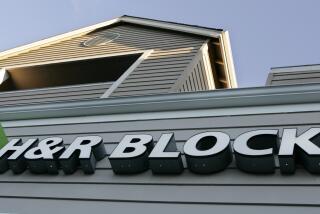German Bank Settles IRS Case
- Share via
HVB Group, a banking firm based in Munich, Germany, agreed Tuesday to pay $29.6 million in fines and restitution to avoid criminal prosecution on charges it helped wealthy Americans evade more than $500 million in taxes.
The bank, owned by UniCredito Italiano, was charged with conspiring to defraud the Internal Revenue Service, evade taxes and file false returns.
Under a deferred prosecution agreement with U.S. authorities, the bank admitted the facts alleged in the charges and entered no plea.
HVB also agreed to cooperate with the Justice Department in its probe of illegal tax shelters.
If HVB doesn’t violate the law for the 18 months prescribed in the accord, the charges will be dismissed, a prosecutor said in Manhattan federal court. If HVB fails to comply with the agreement, the bank may be prosecuted.
“HVB acknowledged and accepted criminal responsibility for its participation in the fraudulent tax shelter activity,” the bank said in a statement.
A former HVB accountant, Domenick DeGiorgio, pleaded guilty in August to defrauding the IRS as part of the federal government’s probe of KPMG, the fourth-largest U.S. accounting firm. DeGiorgio admitted helping promoters of a shelter known as BLIPS sell fraudulent transactions that saved wealthy clients hundreds of millions of dollars in taxes.
KPMG agreed in August to pay $456 million to avoid prosecution over its sale of illegal tax shelters. The firm, which earned about $115 million in fees from the shelters, said they generated at least $11.2 billion in phony losses.
KPMG admitted that it engaged in fraud in designing shelters sold to 601 wealthy clients and said it tried to hide the shelters from the IRS.
Charges against the firm will be dropped if it complies with the agreement, which remains in force through the end of 2006. Failure to comply would expose KPMG to criminal prosecution.
After DeGiorgio’s plea, federal prosecutors in New York accused 19 executives, most from KPMG, of bilking the U.S. Treasury of $2.5 billion by devising transactions that generated phony tax losses for clients. Prosecutors say it’s probably the largest criminal tax case ever.
Tax shelters are sophisticated investments designed to minimize tax liabilities. Accounting firms and investment banks have traditionally sold them to corporations and wealthy individuals, often including a supporting opinion from a law firm.
More to Read
Inside the business of entertainment
The Wide Shot brings you news, analysis and insights on everything from streaming wars to production — and what it all means for the future.
You may occasionally receive promotional content from the Los Angeles Times.










